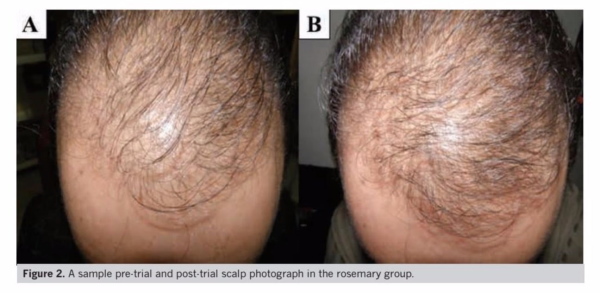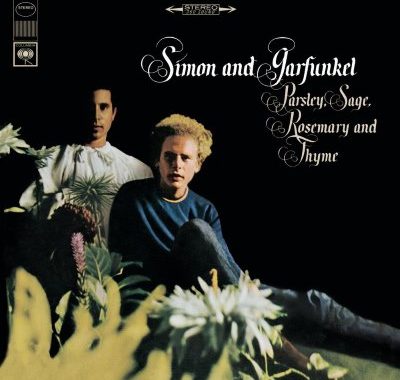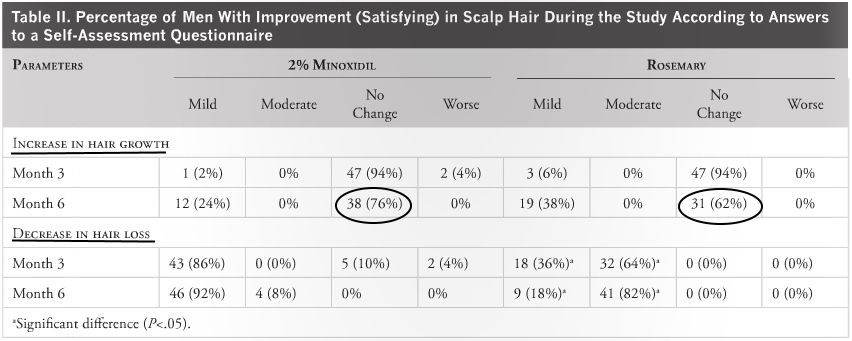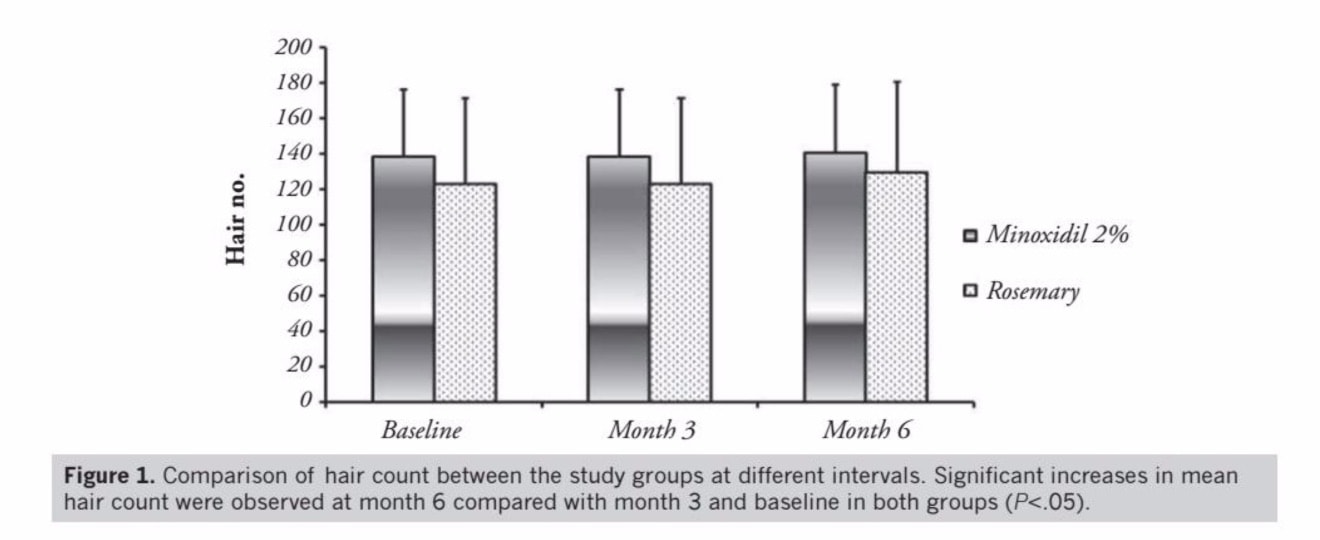Last Updated on July 17, 2023 by Robert Price
Minoxidil, also known as Rogaine, is a heart medication you rub into your head to stop hair loss.
Is rosemary oil a better and safer natural alternative?
It depends on whom you ask.
But most experts will say no.
Or at least, they’ll tell you that minoxidil is the superior option for hair growth.
That’s not to say rosemary oil is a sham treatment though. On the contrary.
In an ocean of snake oils, rosemary oil stands out in the marketplace as one of the few natural remedies for hair loss that may actually work to some degree.
It’s popular among both men and women. It’s been studied, and early research seems to indicate that it can stimulate hair growth. In this in-depth rosemary oil review, I will:
- Review the studies on rosemary oil in plain English.
- Explain the side effects.
- Compare rosemary oil to other hair regrowth treatments like minoxidil
- Offer general usage instructions and much more.
This post contains affiliate links, which means I may receive a small commission on products purchased via this website. I strive to only recommend products I use or would recommend to a family member. With that disclaimer out of the way, let’s review some rudimentary facts about rosemary oil.
Rosemary Oil for Hair Loss & Rejuvenation – The Basics
What is Rosemary Oil?
Derived from rosemary, an aromatic periwinkle shrub, rosemary oil is a popular natural remedy known for its healing properties and enticing scent.
How Does it Treat Hair Loss?
Rosemary oil is believed to function similarly to minoxidil, by reinvigorating hair follicles that are thinning or damaged.
What are its Other Uses?
Naturalists also cite rosemary oil as a remedy for pain, skin health, and as a memory aid.
Rosemary Oil Study
In 2015, Iranian researchers pitted 2% minoxidil vs. rosemary oil in a regrowth competition. The results were surprising. The rosemary oil solution was found to be as effective as 2% minoxidil. Patients in the rosemary group also experienced less side effects compared to the minoxidil group.
After 3 months, neither group showed significant improvements in hair growth. But after 6 months, researchers concluded that both treatments significantly increased the hair counts among the men. Sounds good, right? Not so fast. A before-after photo for your consideration:

Here’s a picture of one of patients from the rosemary group. Not particularly impressive, is it?
And as I dug deeper, the rest of the results were even less encouraging, unfortunately.
The majority of patients — 76% in the minoxidil group vs. 62% using rosemary — reported no change in hair growth. On the plus side, both groups also reported less hair loss. So I guess they thought they weren’t going bald quite as fast — and that’s good, I suppose. For the results of the patient satisfaction survey, see the chart below.
Okay, let’s crunch some more numbers now. At the study’s conclusion, how many actual new hairs did the researchers find in both groups?
Not very many. They noted only a 5.5% increase in total hairs in the rosemary group. Team minoxidil fared even worse, with a 1.7% increase overall.
Next up for your consideration is the hair-count chart. If the numbers look about the same from baseline to the six-month mark, well, that’s because they are:
Another Caveat (And It’s a Big One)
Most men apply a 5% minoxidil product twice daily, not a 2% solution, which is what the men in the aforementioned study used.
The 5% formula is widely considered to be the most potent and effective minoxidil formula on the market.
A 48-week 2002 study showed that 5% topical minoxidil was “clearly superior” to 2% topical minoxidil (source). 45% more regrowth was observed in the 5% group. That’s a lot of regrowth! So, in my opinion, it follows that rosemary oil is NOT as effective as 5% minoxidil.
Second Rosemary Oil Study
Another study was conducted on mice. It wasn’t exactly conclusive. But it found that the topical administration of rosmarinus officinalis leaf extract improved hair regrowth in mice who experienced hair loss as a result of a testosterone treatment. They pumped the poor mice full of hormones, basically, which included varying degrees of baldness. Researchers concluded the rosemary was a “promising crude drug for hair growth” (source).
Study on Essential Oils and Alopecia Areata
Alopecia Areata is another common form of hair loss. If untreated, it can lead to complete hair loss on the scalp, and in some extreme cases, the entire body. This 1998 study showed that essential oils were 29% more effective in treating the condition, compared to a placebo (source).
The active group used essential oils, including thyme, rosemary, lavender, and cedar wood, combined into a mixture with two carrier oils, jojoba and grape seed. They massaged the solution into their scalps daily for 7 months. The researchers concluded that aromatherapy was a “safe and effective treatment for alopecia areata.”
Again, this wasn’t exactly a conclusive study, but it demonstrates rosemary oil’s potential as a hair loss treatment if nothing else.
Side Effects
Rosemary oil is generally well-tolerated. Its side effects are mostly dermatological and include scalp irritation, redness, and flaking.
Rosemary Oil Vs. Other Hair Loss Remedies

Rosemary oil won’t help your follicular cause if you already look like Larry David. But if you still have some hair up top that’s thinning or receding, it could be a beneficial treatment option.
While rosemary is unlikely to solve your hair loss problem by itself, it could be an effective addition to your treatment regimen. I’ve yet to come across a more promising, natural, topical remedy for hair loss. It’s unlikely to work as well as 5% minoxidil in my opinion. And Propecia is still the most effective treatment for hair loss on the market at this time. But if you’re hesitant to use minoxidil or Propecia, and you’re on the mild end of the Norwood Scale, Rosemary oil could be an excellent alternative for you.
Combining Rosemary Oil With Other Treatments
You should talk to your doctor before combining multiple hair loss remedies if possible. That said, rosemary oil can likely be used in conjunction with a variety of other, effective, proven hair loss treatments, including laser therapy, Propecia, and PRP.
You could also create your own, essential oil hair growth formula. More on this later. But briefly, rosemary oil is often combined with other essential oils for hair health and regrowth; those oils include lavender, cedar wood, and thyme.
Two supplements could be worth considering as well: Saw Palmetto and Pumpkin Seed Oil — studies have shown that both of these supplements can slow hair loss and promote regrowth. They’re among the top natural hair loss treatment options at this time. Viviscal, derived from a marine protein complex, is another natural hair loss supplement that shows promise.
Using a derma roller may also slow down your hair loss progression to some degree.
Top 3 Rosemary Oil Products
I looked at many listings and reviews of various rosemary oil products. These 3 rosemary oils all had 600 reviews or more and had 4.6 star ratings, as of February 2017. Also, the brands that manufacturer them seem to have excellent reputations by and large (very important). Here are my top 3 products:
- Radha Beauty Therapeutic Grade Rosemary Essential Oil
- Majestic Pure Rosemary Essential Oil
- NOW Foods Rosemary Oil
Keep in Mind – The supplement and essential oil industries are notoriously unregulated. The quality, consistency, ingredients, and formulation methods used to create each product can vary widely. Purchase a reputable brand and you should be fine. And if you have positive results with a particular rosemary oil product, it would probably be wise to stick with it.
How to Use Rosemary Oil
Many people prefer to use rosemary oil with a carrier oil. Doing this will help minimize side effects. Jojoba oil is perhaps the most popular carrier oil. You should add about six drops of essential oils per every single ounce of Jojoba oil (source). Coconut oil and olive oil are two other popular carrier oils.
There are countless rosemary oil hair growth “recipes” available on the internet. Some people prefer to create their own mixes, using a variety of essential oils. Others administer their treatments one at a time, using approximately 2 tablespoons of a carrier oil with about 5 drops of rosemary oil.
Popular Rosemary Oil Hair Regrowth Recipes
I did some digging and found what appear to be some high-quality rosemary oil blends. Here’s what you’ll need:
- A Measuring Cup
- And a Plastic Bottle with a sprout, which you’ll put your mixes into.
- That’s it, pretty simple!
Recipe 1: Dr. Josh Axe’s Essential Oil Regrowth Formula
This one seems to have a lot of shares, so it may be worth checking out. Dr. Josh Axe is a noted and sometimes controversial naturalist. His essential oil hair regrowth formula (click link to view) consists of the following:
- 1½ ounces jojoba oil
- 1½ ounces grapeseed oil
- 30 drops cedarwood oil
- 30 drops rosemary essential oil
- 30 drops sage essential oil
Instructions
Axe advises putting the jojoba and grapeseed oils into a jar first. Then you add the essential oils and cap the lid. Shake the contents vigorously! He says to apply the essential oil formula generously into the scalp and hair, wet or dry. Then you leave it in your hair for at least 20 minutes, or “longer if you can.” Some even leave it in overnight, while wearing a shower cap or towel to prevent stains. You can do this treatment either every day or 3 times per week.
Recipe 2: The Scientifically Backed Essential Oil Solution
This is the formula they used in the 1998 study, which showed that rosemary oil was a safe and effective treatment option for alopecia areata. It contains all the same ingredients used in Dr. Axe’s formula, just in different amounts, plus thyme oil. Here is the formula:
- Jojoba oil, 3 milliliters
- Grapeseed oil, 20 millileters
- Rosemary oil, 3 drops (114 milligrams)
- Lavender oil, 3 drops (108 milligrams)
- Thyme oil, 2 drops (94 milligrams)
- Cedarwood oil, 2 drops (94 milligrams)
Instructions
In the study, the essential oils were applied via a scalp massage, for a minimum of two minutes. A warm towel was applied afterward, to help promote absorption. The study didn’t specify how long the patients left the treatment in for. Patients were advised to use the same scalp massage and toweling each night.
Recipe 3: The Hot Rosemary Oil Treatment
This one sounds luxurious! Looks pretty simple to do, too. The heat will help open up your pores and nourish your roots. It will help you achieve the lush, healthy hair you’re after and possibly reverse some damage. Here are the ingredients:
- Coconut oil, 2 teaspoons
- Castor oil, 2 teaspoons
- Rosemary oil, 4-5 drops
Instructions
First you’ll heat the carrier oils (coconut and castor) in a small pan, on a low flame. Be careful! You don’t want to overheat the oils — if you do that, you may see smoke! Then, simply add the 4-5 drops of the rosemary oil. You may want to use a glass or metal container to hold the hot rosemary treatment. Give it a quick stir with a spoon and massage it into your scalp. Let it sit for a good 15 minutes or so after application. You can try this hot rosemary technique once or twice a week. You may want to shampoo and condition your hair after application.
Recipe 4: Basic Rosemary Treatment with a Carrier Oil
This is a very simple one and perhaps a good starting recipe for a lot of you. You can add other ingredients later if desired. It contains
- Rosemary oil, 5-6 drops
- 2 tablespoons of a carrier oil. Jojoba is a good option, as are coconut, castor, and olive oils.
Instructions
Mix the rosemary with the carrier oil. Jojoba is sometimes considered the best carrier oil for hair loss, though opinions vary. Give yourself a thorough scalp massage and leave the treatment in for at least 20 minutes, then rinse. Showering and conditioning your hair afterwards is often advised.
7 Rosemary Oil Benefits
- Affordable – It probably won’t cost you more than a few dollars a month, even if you use it regularly.
- All-natural – If you don’t like the idea of rubbing chemicals into your head, rosemary oil is worth considering. It looks like it’s a somewhat viable and effective alternative to minoxidil.
- Antibacterial – rosemary oil is used to treat and prevent dandruff, flaky skin, and other conditions that may lead to hair fall.
- Anti-Inflammatory – Inflammation is a major cause of unhealthy hair and skin. Rosemary oil can help reduce inflammation naturally detoxify your scalp.
- Few Side Effects – Most people tolerate rosemary oil with no issues.
- Healthier Hair – Even if you’re not going bald, you will enjoy stronger, silkier, and more beautiful hair by treating it with rosemary oil.
- Stimulates Growth – Rosemary oil can help reinvigorate your weak and thinning hair follicles.
The Downsides
- Unproven, Long-Term – How long will rosemary oil halt or slow down your hair loss? There’s no way to answer that question with certainty. Time will tell how effective it is in the long-term.
- May be a Hassle – Mixing essential oil formulas, letting them sit, rinsing and repeating, tying out new recipes, etc., all may lead to frustration. It may not be worth the hassle for some of you.
Rosemary Oil Review – Closing Thoughts
My Take on Rosemary Oil
I’ve thoroughly reviewed rosemary oil as a hair loss treatment, its safety, and its efficacy. Ultimately, I believe 5% minoxidil is a better, more effective option. That said, I realize many people don’t like the idea of rubbing chemicals into their scalps everyday. And as far as natural, topical, hair loss treatments go, rosemary oil is likely one of the best, if not the best, all-natural remedy available.
It probably won’t help slow or stop your hair loss completely. It almost certainly won’t. But talk to your doctor. Ideally you should combine the rosemary oil with a proven treatment, like finasteride or laser therapy. But you could also consider adding more supplements to your regimen. Saw Palmetto and pumpkin seed oil both appear to help combat male pattern hair loss, so those supplements are certainly worth looking into. Buzzing your head bald is a perfectly viable course, as well!
What are your thoughts on rosemary oil? Is it worth trying, in your opinion? Feel free to share your thoughts and experiences in the comment section.
Robert Price is a writer, consumer advocate, and hair loss researcher with thousands of hours of experience in the field. His goal is to keep you out of the hair loss rabbit hole, underworld, or whatever you want to call it. He founded Hair Loss Daily, the unbiased hair loss blog, in 2016. You can learn more about Robert in the my story section of this website.




Can I use rosemary oil along with my 5% Rogaine regime?
Hi Christine,
There’s no strict rule on combining minoxidil with essential oils, as far as I know. You probably can, and you probably won’t have an issue, and it could improve your regrowth prospects. I’d advise checking with a doctor first. You’ll have a higher chance of experiencing skin irritation and other dermatological issues if you use both — but other than that, I’m not aware of any major side effects of combining the two treatments.
Hey, it’s the first time I read alopecia areata, “if left untreated, it can lead to complete hair loss on the scalp”. I hope it isn’t! Most doctors say the hair regrows usually within a year.
I am thinking of trying what Christine mentions…am thinking that the oil may retard the absorption of Rogaine. And plan to try using aloe vera gel as a “carrier oil” for rosemary, thyme, cedarwood, and lavender oils..
Women aren’t encouraged to use 5% minodixil anyway….so this looks like a good alternative!
I tried Minoxidil and saw noeffects. I am willing to try Rosemary oil. My hair was accidentally cut out on top and haven’t Brown back in 14years! So I am almost desperate! Praying this Rosemary works…
Good luck with the rosemary! Honestly, if the minoxidil worked for you without side effects, that’d be the better option in my view. But try the rosemary if you want to. You could also consider adding light therapy or a ketoconazole shampoo to your regimen if you really want to maximize your gains.
Prescription options are available too, as I discuss more thoroughly in my post on the top female hair loss treatments.